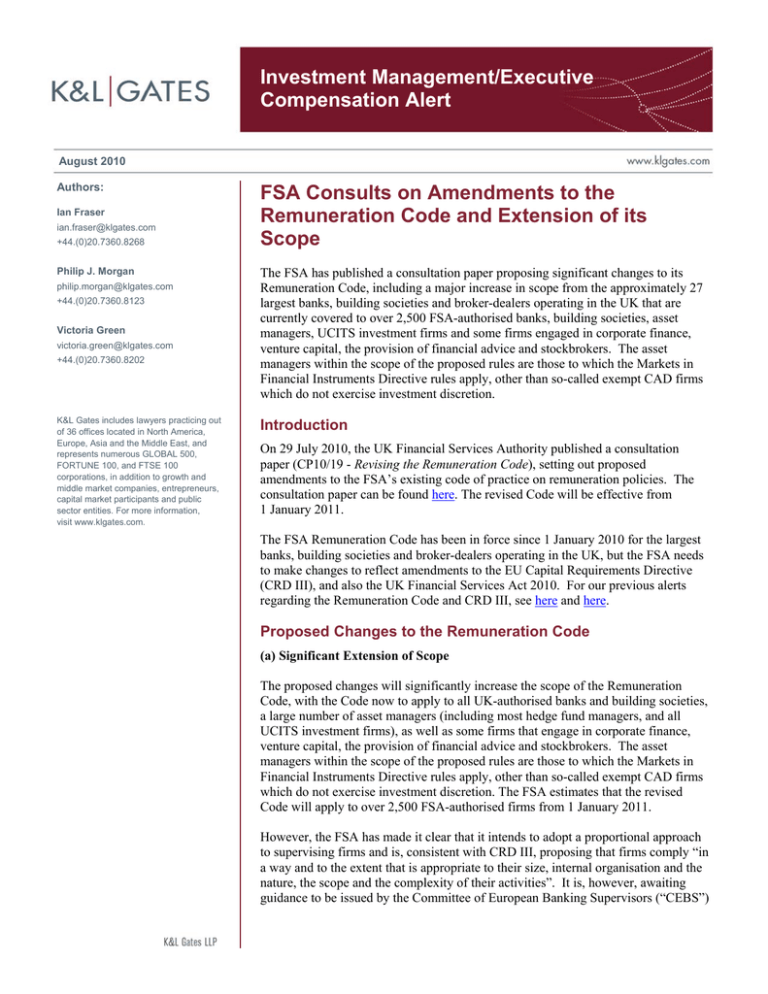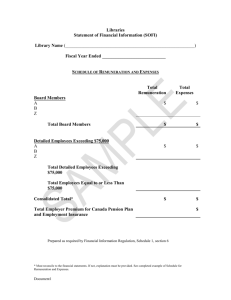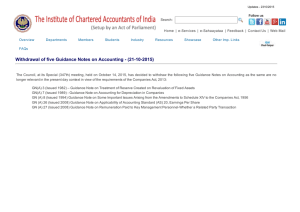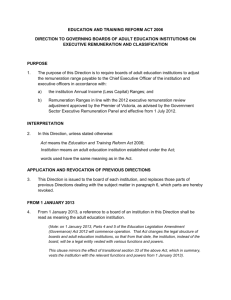
Investment Management/Executive
Compensation Alert
August 2010
Authors:
Ian Fraser
ian.fraser@klgates.com
+44.(0)20.7360.8268
Philip J. Morgan
philip.morgan@klgates.com
+44.(0)20.7360.8123
Victoria Green
victoria.green@klgates.com
+44.(0)20.7360.8202
K&L Gates includes lawyers practicing out
of 36 offices located in North America,
Europe, Asia and the Middle East, and
represents numerous GLOBAL 500,
FORTUNE 100, and FTSE 100
corporations, in addition to growth and
middle market companies, entrepreneurs,
capital market participants and public
sector entities. For more information,
visit www.klgates.com.
FSA Consults on Amendments to the
Remuneration Code and Extension of its
Scope
The FSA has published a consultation paper proposing significant changes to its
Remuneration Code, including a major increase in scope from the approximately 27
largest banks, building societies and broker-dealers operating in the UK that are
currently covered to over 2,500 FSA-authorised banks, building societies, asset
managers, UCITS investment firms and some firms engaged in corporate finance,
venture capital, the provision of financial advice and stockbrokers. The asset
managers within the scope of the proposed rules are those to which the Markets in
Financial Instruments Directive rules apply, other than so-called exempt CAD firms
which do not exercise investment discretion.
Introduction
On 29 July 2010, the UK Financial Services Authority published a consultation
paper (CP10/19 - Revising the Remuneration Code), setting out proposed
amendments to the FSA’s existing code of practice on remuneration policies. The
consultation paper can be found here. The revised Code will be effective from
1 January 2011.
The FSA Remuneration Code has been in force since 1 January 2010 for the largest
banks, building societies and broker-dealers operating in the UK, but the FSA needs
to make changes to reflect amendments to the EU Capital Requirements Directive
(CRD III), and also the UK Financial Services Act 2010. For our previous alerts
regarding the Remuneration Code and CRD III, see here and here.
Proposed Changes to the Remuneration Code
(a) Significant Extension of Scope
The proposed changes will significantly increase the scope of the Remuneration
Code, with the Code now to apply to all UK-authorised banks and building societies,
a large number of asset managers (including most hedge fund managers, and all
UCITS investment firms), as well as some firms that engage in corporate finance,
venture capital, the provision of financial advice and stockbrokers. The asset
managers within the scope of the proposed rules are those to which the Markets in
Financial Instruments Directive rules apply, other than so-called exempt CAD firms
which do not exercise investment discretion. The FSA estimates that the revised
Code will apply to over 2,500 FSA-authorised firms from 1 January 2011.
However, the FSA has made it clear that it intends to adopt a proportional approach
to supervising firms and is, consistent with CRD III, proposing that firms comply “in
a way and to the extent that is appropriate to their size, internal organisation and the
nature, the scope and the complexity of their activities”. It is, however, awaiting
guidance to be issued by the Committee of European Banking Supervisors (“CEBS”)
Investment Management/Executive Compensation Alert
before finalising its approach to the proportional
application of the Remuneration Code.
of all Code staff ahead of the bonus allocation
period in respect of 2010.
In the meantime the FSA is proposing a sub-division
of the Code into three groups of rules:
The FSA is considering whether individual
proprietors and the general partners of limited
partnerships should be subject to the Code.
However, the consultation paper notes that limited
partners are considered to be subject to the Code,
which could be seen as surprising in that they are
not employees receiving remuneration and
significant tax issues could arise where deferral is
required.
i.
minimum requirements expected of all firms;
ii. rules which could be applied proportionally in
line with a firm’s nature, scale, scope and
complexity; and
iii. rules which could be applied on a ‘comply or
explain’ basis.
CP 10/19 contains more detail on how the FSA
believes this sub-division could work but invites
relevant trade bodies to assist with the process of
determining the way in which the rules will apply to
different kinds of firm. Greater clarity for firms
newly within the scope of the Remuneration Code
should emerge when the FSA publishes examples
and guidance following its work with relevant trade
bodies. At present the FSA’s proposal is to include
some of the more specific and, for asset managers,
potentially problematic provisions from CRD III and
the current Remuneration Code, such as the deferral
requirements and restrictions on guaranteed bonuses
(each described more fully below), in the ‘comply or
explain’ category.
(c) Proposed Limits on Bonuses
•
At least 40% of any Code staff’s variable
remuneration must be deferred for at least three
years. It is currently proposed that this would
increase to 60% where either total remuneration
or total variable remuneration (CP 10/19 is
ambiguous on this point) exceeds £500,000.
•
At least 50% of any Code staff’s variable
remuneration (deferred or non-deferred) must
be delivered in shares or share-linked
instruments and (where appropriate) capital
instruments which reflect the credit quality of
the firm. The equity instruments must be
subject to a minimum retention policy. The
FSA concedes that its interpretation of CRD III
on this point is different from an interpretation
advanced in a press release on behalf of the
European Parliament rapporteur to the effect
that the 50% requirement should apply
separately to the deferred and non-deferred
portions of variable remuneration. Accordingly
the FSA says that its view on this point may
change following its consideration of the
awaited final CEBS guidance referred to above.
•
Guaranteed bonuses can only be offered in
exceptional circumstances to new hires for the
first year of service. The payments should not
be more generous in either amount or term than
the variable remuneration awarded or offered
by the previous employer and should be subject
to performance adjustment.
•
Retention guarantees should only be offered in
exceptional circumstances.
Other significant changes are:
(b) Staff Proposed to be Affected
Under the current Code, the main rules prescribing
remuneration policies arise under Principle 8 of the
Code and only apply to “persons who perform a
significant influence function for a firm and
employees whose activities have or could have a
material impact on the firm’s risk profile” (generally
known as “Principle 8 employees”). Under the
revised Code, it is proposed that the Principle 8
employee group will be replaced with a similar
group referred to as “Code staff”, which is expected
to include senior management, persons who perform
a significant influence function for the firm, and
staff receiving total remuneration that takes them
into the same remuneration bracket as senior
management and risk takers, whose professional
activities may have a material impact on the firm’s
risk profile. Firms will be expected to compile a list
August 2010
2
Investment Management/Executive Compensation Alert
•
Total variable remuneration must not limit the
firm’s ability to strengthen its capital base, and
must be significantly reduced if the firm’s
financial performance is subdued or negative.
•
The current de minimis level which exempts
from deferral requirements staff whose bonus
forms less than 25% of their total remuneration,
and whose total remuneration is less than or
equal to £500,000 will be extended to Code staff
whose variable pay is up to 33% of total
remuneration. It is proposed that such staff
would not be subject to rules relating to deferral,
performance adjustment, proportion of
remuneration paid in shares, and guaranteed
bonuses.
(d) Proposals on Severance Pay
It is proposed that severance payments will now be
brought within the Code to ensure that they reflect
performance over time and are not a reward for
failure. Likewise the FSA proposes limits on
enhanced discretionary pension contributions (i.e.
one-off payments, not standard pension plan
contributions), which must take the form of shares or
share-linked instruments and be held for at least five
years. The FSA has indicated that they expect both
of these provisions to be relevant only to the most
highly remunerated Code staff in large firms.
(e) New Voiding Power
It is expected that breaches of the revised Code will
render contractual provisions void and/or require
recovery of payments made. The FSA propose only
to apply this to provisions that clearly breach the
rules on bonus deferral and guaranteed bonuses.
Timing
The consultation period ends on 8 October 2010, and
the FSA is encouraging comments to be submitted
through trade associations. In addition, the final
wording of CRD III is expected to be released in
October 2010, as are the guidelines being worked on
by the CEBS. The CEBS guidelines are particularly
relevant as they will include guidance on
proportionality, the appropriate ratios of fixed versus
variable remuneration and public disclosure, which
will be of key importance especially to firms which
will be coming within the scope of the Code for the
first time. Final wording for the Code is therefore
not expected until November 2010, with the Code
coming into force with effect from 1 January 2011
for remuneration awarded or paid on or after that
date.
This is a very tight timescale and is going to be of
particular concern to companies not within the
scope of the current Code. Because of this, the FSA
has introduced transitional provisions for these
firms stating that they can rely on the
proportionality principles in the Code to justify less
than full compliance by 1 January 2011. However,
firms must take reasonable steps to comply as soon
as possible and in any event by 1 July 2011. This
also applies to firms currently within the scope of
the Code if they are not able to comply with the
requirement to pay 50% of variable remuneration in
shares or equivalent instruments by 1 January 2011,
although the likelihood is that only non-listed
companies will be able to make use of this.
Comment
The proposed extension of the scope of the
Remuneration Code will mean that a large number
of firms will need to consider compliance for the
first time. While the CEBS guidance on
proportionality may mean that the FSA can take a
light touch approach in certain cases, it is clear that
all firms within the revised scope of the Code will
have additional obligations. Firms coming into the
scope of the revised Remuneration Code should
consider whether their remuneration policies and
practices need to be adjusted as soon as possible to
be in a position to comply with the FSA’s tight
timescales. Depending on the size and type of firm,
significant new FSA reporting obligations could
arise in relation to remuneration. Also, new public
disclosure obligations could arise following the
issue of the CEBS guidance.
The new Code will apply to remuneration awarded
on or after 1 January 2011, and to payments made
after 1 January 2011 that relate to contracts
concluded or services provided in 2010 or earlier.
Firms that have entered into binding remuneration
commitments may wish to consider paying them out
before 31 December 2010 if compliance with the
revised Code appears problematic.
August 2010
3
Investment Management/Executive Compensation Alert
Anchorage Austin Beijing Berlin Boston Charlotte Chicago Dallas Dubai Fort Worth Frankfurt Harrisburg Hong Kong London
Los Angeles Miami Moscow Newark New York Orange County Palo Alto Paris Pittsburgh Portland Raleigh Research Triangle Park
San Diego San Francisco Seattle Shanghai Singapore Spokane/Coeur d’Alene Taipei Tokyo Warsaw
Washington, D.C.
K&L Gates includes lawyers practicing out of 36 offices located in North America, Europe, Asia and the Middle East, and represents numerous
GLOBAL 500, FORTUNE 100, and FTSE 100 corporations, in addition to growth and middle market companies, entrepreneurs, capital market
participants and public sector entities. For more information, visit www.klgates.com.
K&L Gates comprises multiple affiliated entities: a limited liability partnership with the full name K&L Gates LLP qualified in Delaware and
maintaining offices throughout the United States, in Berlin and Frankfurt, Germany, in Beijing (K&L Gates LLP Beijing Representative Office), in
Dubai, U.A.E., in Shanghai (K&L Gates LLP Shanghai Representative Office), in Tokyo, and in Singapore; a limited liability partnership (also named
K&L Gates LLP) incorporated in England and maintaining offices in London and Paris; a Taiwan general partnership (K&L Gates) maintaining an
office in Taipei; a Hong Kong general partnership (K&L Gates, Solicitors) maintaining an office in Hong Kong; a Polish limited partnership (K&L
Gates Jamka sp.k.) maintaining an office in Warsaw; and a Delaware limited liability company (K&L Gates Holdings, LLC) maintaining an office in
Moscow. K&L Gates maintains appropriate registrations in the jurisdictions in which its offices are located. A list of the partners or members in each
entity is available for inspection at any K&L Gates office.
This publication is for informational purposes and does not contain or convey legal advice. The information herein should not be used or relied upon
in regard to any particular facts or circumstances without first consulting a lawyer.
©2010 K&L Gates LLP. All Rights Reserved.
August 2010
4



